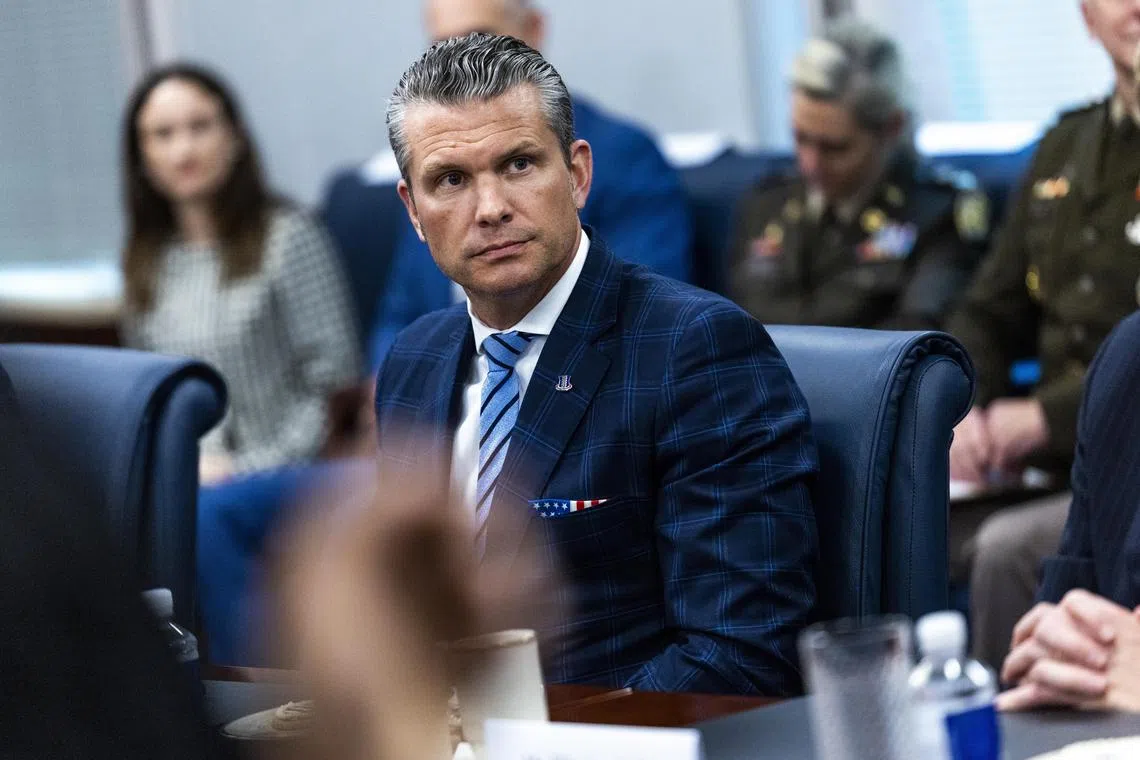Hegseth tells China in first call that US is not seeking conflict
Sign up now: Get ST's newsletters delivered to your inbox

The Pentagon said Mr Hegseth and Chinese Defence Minister Admiral Dong Jun held their “candid and constructive” call on Sept 9.
PHOTO: EPA
Follow topic:
WASHINGTON - US Secretary of War Pete Hegseth held his first conversation with his Chinese counterpart and stressed that the United States does not seek conflict with China, but will protect its vital interests in the Asia-Pacific region, the Pentagon said on Sept 10.
China is Washington’s main geopolitical rival, and Mr Hegseth angered Beijing in May when he urged regional allies to spend more on defence
Pentagon spokesman Sean Parnell said Mr Hegseth and Chinese Defence Minister Admiral Dong Jun held their “candid and constructive” call on Sept 9.
“Secretary Hegseth made clear that the United States does not seek conflict with China nor is it pursuing regime change or strangulation of the PRC (People’s Republic of China),” he said.
“At the same time, however, he forthrightly relayed that the US has vital interests in the Asia-Pacific, the priority theatre, and will resolutely protect those interests.”
Mr Parnell said the two agreed to additional discussions.
US President Donald Trump has ordered the Department of Defence to rename itself the Department of War
The new name would apply to Mr Hegseth as well, altering his title to “Secretary of War”.
The talks followed a major military parade last week
Mr Trump responded by saying that Mr Xi, Mr Putin and Mr Kim were conspiring against him.
A US official said Mr Trump was “disappointed to see some countries siding with the Chinese” and that “America is going to re-evaluate” the situation.
China’s state-run news agency Xinhua said the Sept 9 video call was held at Mr Hegseth’s request.
It said Adm Dong urged Mr Hegseth to maintain communication and an open attitude, and to foster stable and positive military ties based on “equal respect, peaceful coexistence, and mutual respect”.
Xinhua also cited Adm Dong as saying China was committed to working with regional countries to maintain peace and stability in the South China Sea, a strategic waterway where China and other states have rival claims, and opposes “the infringement and provocation of certain countries and the deliberate incitement of countries not in the region”.
The State Department said US Secretary of State Marco Rubio also spoke on Sept 10 with Chinese Foreign Minister Wang Yi
The July meeting was described by both sides at the time as positive and constructive, despite tension over Mr Trump’s global tariff offensive, in which China has been a major target.
In August, Washington and Beijing extended a partial truce for 90 days

